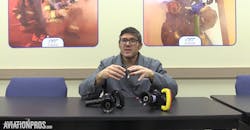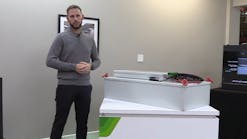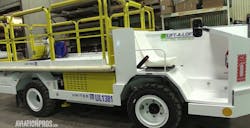My big mistake occurred 18 years ago shortly after my first year as an aircraft mechanic at LaGuardia Airport. I still wince in shame as I recall the event.
It was during the midnight shift and the temperature was in the single digits with sleet falling nearly sideways. The wind gusts were blowing at 30 to 40 knots.
We were doing our normal layover routine and I had to oil the engines. I did the wing engines first and used a lift truck to reach the No. 2 engine, which is about 15 feet up. To get to the No. 2 engine, I had to crouch as I went up because the lift truck was rocking in the wind and I did not want to lose my balance. Then, I had to climb through a 2’ x 2’ hole and find a toehold on stringers while reaching for the oil cap and chip detectors. By this time, I was cold soaked and wet. Inside the dark, slippery hole, I knew that I was going to get oil all over myself as I held onto the stringers and opened my oil cans – especially since the tail was bouncing in the wind. I poured my 10 to 15 quarts of oil (three on myself) and looked at the chip detector that I had to reach high for and check. My fingers were numb and I was miserable. I had checked more than 100 chip detectors on this type of engine in my one year and had never seen anything more than a flake or two. Under the circumstances, I made a judgment call based on my "experience" and blew off checking that chip detector. Then, I pencil whipped that item on my paperwork.
The following night, as I pulled into the employee parking lot, my blood turned to ice as I saw that same L-1011 flooded in light and surrounded by mechanics changing the No. 2 engine in the freezing cold rain. I was in a state of shock as I walked into the line shack. I figured my career was about to come to a humiliating end. The aircraft was loaded with passengers, on its take off roll, on a short runway that required all the horsepower possible, in bad weather when the No. 2 engine failed. The flight crew was able to abort the takeoff without further incident. Surprisingly, nobody ever questioned me about it. The engine was near the end of its service time when it failed. A borescope inspection had shown that the compressor blades were worn. A fellow mechanic who began investigating the problem said that when he pulled the chip detector from the oil line it had a bouquet of flakes on it! In fact, the oil line was so packed with metal that he could not reinstall it!
I was lucky. Things could have gone south very easily. I could have killed more than 200 people. I didn’t do anyone a favor with my judgment call. My co-workers had to spend 30 hours in the elements to change the engine. The passengers had to be inconvenienced for the rest of the day, as they were booked on alternate flights. My company lost the revenue. I undercut the value of my tickets by pencil whipping and I couldn’t sleep for days. All of this could have been prevented with five more minutes of work.
The lessons learned:
1. Never, ever pencil whip. You will de-value our tickets and put others in danger.
2. You are trusted as an aircraft mechanic for a reason. It doesn’t matter if you are having a good or bad night. You have to do what you are paid to do – assure the safety of the aircraft and its passengers regardless of the weather, time of day, or morale. Period.
Send us your story: AMT, Lessons Learned, 1233 Janesville Ave., Fort Atkinson, WI 53538 or email to [email protected].





